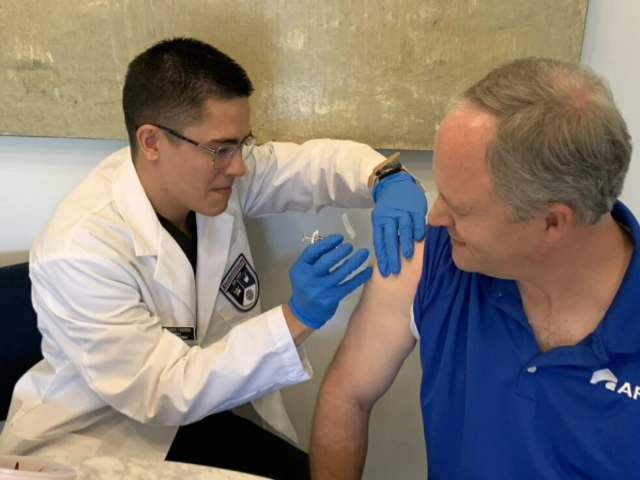
This week, Samford's McWhorter School of Pharmacy transitioned the first students under the new Doctor of Pharmacy curriculum into Advance Pharmacy Practice Experiences (APPE). In 2017, Dean Michael Crouch and faculty began working to transform the curriculum to address the profession's ever-expanding role in health care and redefine the structure of each semester.
After several years of research and planning, the school implemented the revised curriculum in the 2020 academic year. Dean Crouch's vision has come to fruition for the class of 2025 students.
Pharmacy students spend the first three years completing didactic classwork. The fourth-year rotations enable student pharmacists to acquire practical experience and develop professional competence in various clinical settings from faculty or preceptors. They are required to complete 1,600 hours of clinical experience in their P4 year. The individualized experiences include primary/ambulatory care, community pharmacy, general medicine, institutional/healthcare systems pharmacy, selective (medicine specialty) and three electives.
"Experiential education, particularly through Advanced Pharmacy Practice Experiences (APPE), bridges the gap between theory and practice, cultivating the skills and confidence needed for real-world pharmacy practice, " said Jeff Kyle, PharmD, BCPS, professor of pharmacy practice at Samford and vice chair and director of experiential education.
The APPE component was previously the final stage of the Doctor of Pharmacy curriculum. Clinical rotations now begin slightly earlier, allowing time for students to return to campus to learn from each other's experiences. This is a distinctive example of how McWhorter School of Pharmacy graduates are more than prepared to handle the complex challenges that healthcare faces today, no matter where they are called to serve.
Kenneth J. Machado Figueroa is one of Samford's first APPE students. "Experiences like these provide a bridge between theoretical knowledge acquired in the classroom and practical application. It is an ideal platform for implementing our academic foundations while facilitating further learning and skill development," said Figueroa.
